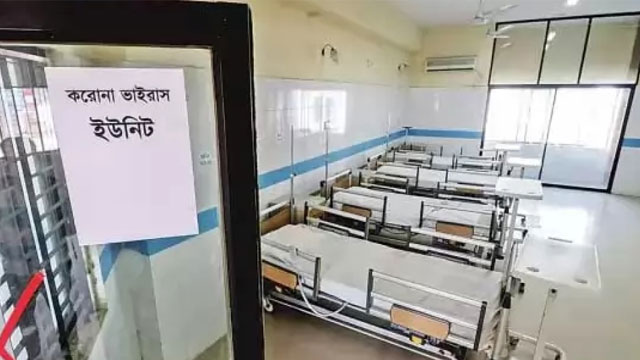Hospitals dedicated for coronavirus treatment have only 250 ventilators. Some of them are not being used due to shortage of accessories and manpower. There is also a shortage of manpower in the ICU units.
In addition to that, there is no dialysis treatment for coronavirus patients outside the capital, according to the concerned officials of the integrated control room of the health directorate and several hospitals.
According to the World Health Organization, 15 per cent of the total coronavirus patients have acute symptoms of which 5 per cent patients have complicated symptoms.
Many of these 20 per cent need ventilators in addition to ICU services. Patients with severe kidney problems may need dialysis. Shortage of ICU beds, ventilators and dialysis is now a global problem. Bangladesh is no exception.
However, these services and instruments are not being used to the maximum in the hospitals designated for coronavirus in Bangladesh. But public health experts say some problems can be easily solved.
Additional director general of the Directorate General of Health Services (DGHS) Nasima Sultana admitted that there are some issues with ICU, ventilator and dialysis.
“All the ICU beds or ventilators won’t be used due to lack of some accessories or equipment. In some cases, there is also a shortage of manpower. However, efforts are being made to address these issues,” she said.
Intensive Cere Unit and Dialysis
Elderly patients with coronavirus as well as other chronic diseases need intensive care unit. Beds are important in intensive care, known as ICU beds. According to DGHS’ integrated control room, there are 13,984 beds in coronavirus hospitals across the country of which only 399 are ICU beds.
According to the data, there are 218 ICU beds in the coronavirus hospitals in the capital Dhaka. Of these, 137 are in government hospitals and 81 in private hospitals. According to the data of patients admitted in different hospitals on 11, 12 and 13 May, an average of 143 ICU beds are being used in the capital.
Several COVID-19 patients and their families expressed dissatisfaction with the ICU ward service to Prothom Alo. A member of the National Technical Advisory Team on coronavirus told Prothom Alo that nurses play a vital role in the ICU ward. ICU nurses need special training.
“There are fewer such nurses in the country, and even fewer in coronavirus hospitals. No one is monitoring whether the officials are working properly,” he added.
Many coronavirus patients suffer from chronic kidney problems. According to the information received so far, 1.4 per cent of the patients are in need of dialysis. Last week, 47 such patients were receiving this service in different hospitals. Hospitals dedicated for coronavirus treatment have a total of 106 dialysis beds. There is no dialysis facility in any corona hospital outside the capital.
There are complaints about existing facilities of dialysis too. The patient has to take dialysis at home for about four hours. Sometime nurses are not available immediately if there is any problem during this time. It has been alleged that the dialysis unit of the hospital is not cleaned regularly.
Additional director of DGHS Nasima Sultana told Prothom Alo, "There are other departments who will look after the matter with nurses."
She suggested contacting the health secretary (Health Education and Nursing Services). When contacted, health secretary Ali Noor told Prothom Alo, "No one has complained to us yet." He said he would talk to the directors of two specific hospitals.
Use of ventilators low
It is discussed time and over that there are fewer ventilator devices in the country. However, research has shown that not even half of the ventilators are being used. This device helps the critically ill patients to breathe artificially.
There are different types of this device. An instrument of a type is used for one patient. Again there are types that can be used for two. Hospital sources say that most of the devices in Bangladesh are for single patients.
The DGHS' integrated control room says 298 ventilators have been purchased for government hospitals across the country in recent years. Of these, 251 devices have been installed at coronavirus hospitals.
The remaining 47 are lying idly in various hospitals. Besides, 21 ventilators were purchased at the Central Medical Stores Depot (CMSD). Recently, the ministry of health has purchased 20 more ventilators. In addition, there are 400 ventilators in private hospitals.
The information that Prothom Alo has collected about the services for different types of patients shows that ventilators are being used more in Rajarbagh Police Line Hospital. During the three days of May, 0.6 per cent of the patients in the hospital need a ventilator. Half of it is in the police line hospital.
Mugda General Hospital authorities said the hospital has 14 ventilators, 4 of which cannot be used as there is no monitor. There is also a shortage of manpower in that hospital.
Expert physicians say that anaesthetists know how to use a ventilator well. This specialized work is theirs. There is a shortage of such experts in the country.
The National Technical Advisory Committee discussed this at its meeting on 28 April. In their recommendation to the ministry of health at the end of the meeting, they said that a sufficient number of anaesthetists need to be recruited in coronavirus hospitals.
Professor Nasima Sultana said, "There was always a shortage of anaesthetists in the country. Arrangements will be made to recruit manpower from the 2,000 newly recruited doctors.”
Professor Mohammad Shahidullah, convener of the National Technical Advisory Committee on coronavirus formed by the ministry of health and president of the Bangladesh Medical and Dental Council (BMDC), told Prothom Alo, "It is a matter of management, which can be easily met. There are trained anaesthetists in the country. There are experienced physicians working in the ICU. Nurses appointed in ICUs in many hospitals remains without work most of the time. Initiatives can be taken to bring them to coronavirus hospitals for now.”-Prothom Alo





